#american law
Text
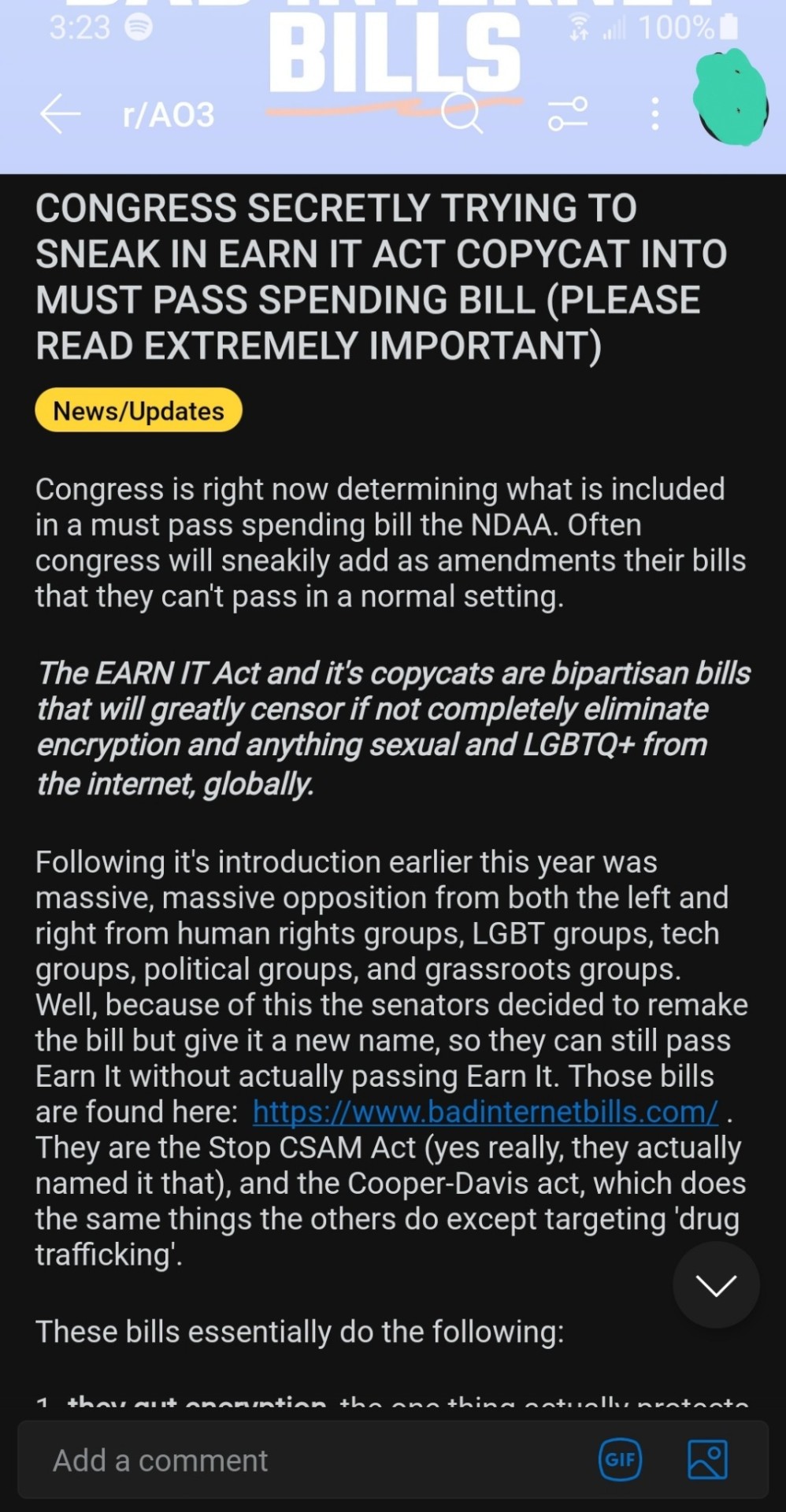

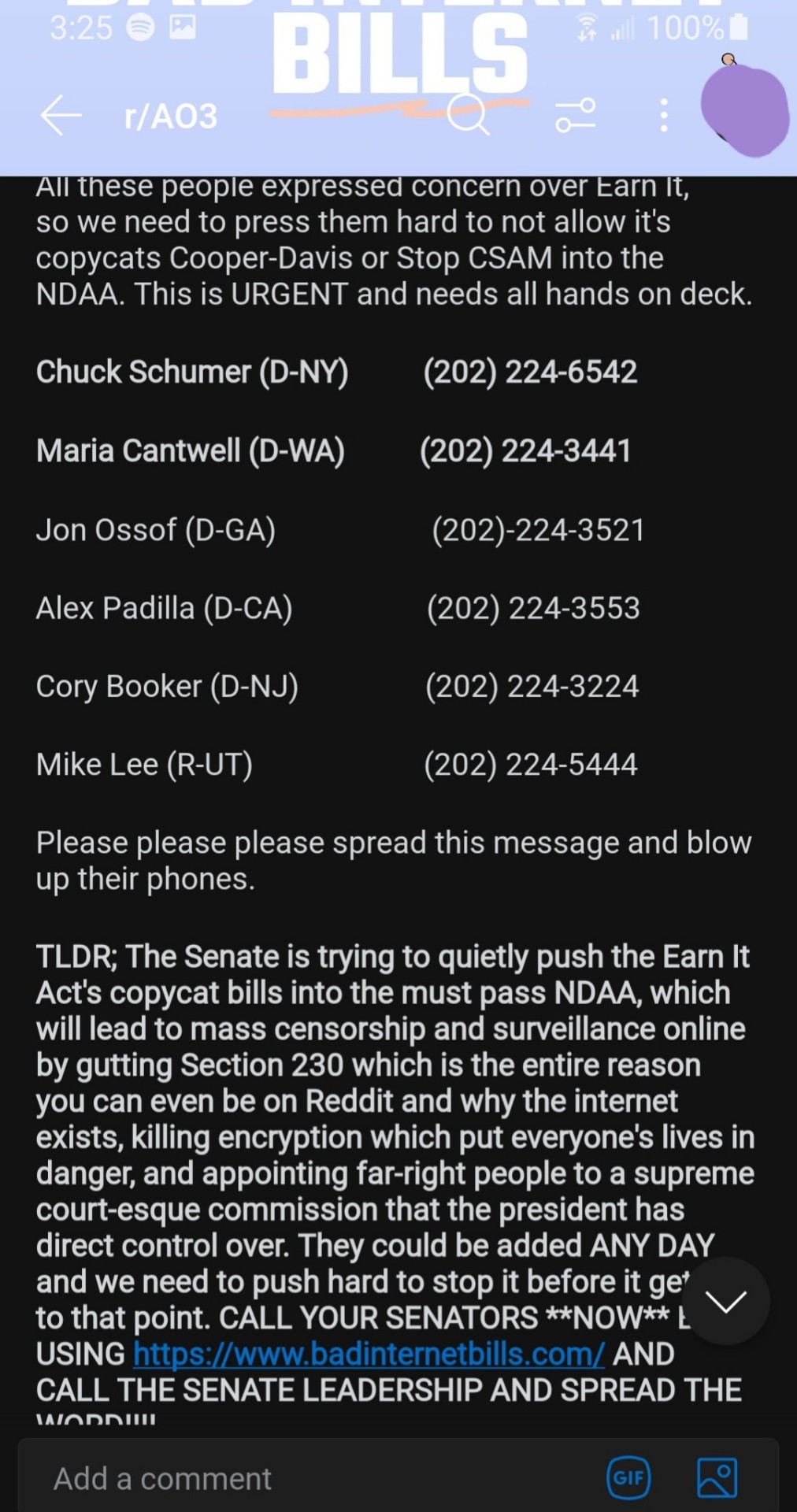
#ao3#archive of our own#earn it act#earn it bill#copycat earn it act#stop kosa#kosa act#stop bad internet bills#first amendment#censorship#CODE RED YOU GUYS#reddit#r/ao3#reddit news#fanfic#fanfiction#ao3 news#united states law#usa#american law#2023#online safety#online encryption#privacy#privacy rights#privacy regulations
250 notes
·
View notes
Text
Work Expenses: Who Pays?
There are all sorts of work-related expenses out there that an employee might have to face, from the cost of their work uniform to the cost of cleaning their work uniform to bills for the cell phone they use for work calls to the cost of that laptop used for working from home.
The question is, under the law, when is the employer mandated to pay for such expenses, rather than leaving them to the individual employee to bear?
Summary: Under federal law, the only requirement is that expenses not bring employees' pay under minimum wage.
California and Illinois say the employer must cover "necessary expenditures and losses" including remote work equipment.
Montana, North Dakota, and South Dakota also say the employer must cover all the employee "expends or loses" due to work.
Washington D.C. says the employer must pay for required tools.
Iowa, New York, and New Hampshire require that the expenses be "authorized" by the employer or that employer and employee have an "agreement" beforehand for the employer to be liable for the costs. Iowa says such costs must be reimbursed within 30 days.
Minnesota requires that employee-paid work expenses be limited to $50 a month, and that the employer reimburse such costs at the end of the employee's employment.
Massachusetts requires that employers pay transportation expenses and the cost of uniforms specifically.
Federal law says only that if the employee's paying for expenses, that can't be used to effectively bring their wages below minimum wage level. So, if you're making minimum wage at a McDonald's, your employer can't then take the price of your work uniform out of your first paycheck, because then you'd effectively be making less than minimum wage.
This doesn't just apply to expenses directly paid to the employer, either; the statute specifically says that if the employee is required to buy their own tools required for a job, they have to be reimbursed if that would mean their pay going below minimum wage after deducting the cost of the tools from their pay.
But this only comes into play in connection to minimum wage. If your pay is high enough that your work expenses would still leave you above minimum wage, federal law doesn't say anything else making your employer liable for the cost.
But that's federal law. US law in general, and especially labor law, often has more specific restrictions within certain states, and this is no exception.
California law says that the employer has to pay for "all necessary expenditures or losses incurred by the employee in direct consequence of the discharge of his or her duties". In other words, if it's necessary for the job, under California law, the employer should be footing the bill. What counts as a "necessary expenditure or loss"? Excellent question. No definition is given for this in the statute, so it's all open for debate... though a recent court case suggests it includes remote working equipment, including for jobs that are normally in-person but went to remote work during the lockdown.
Illinois state law uses similar wording, with the employer paying for "all necessary expenditures or losses incurred by the employee within the employee's scope of employment and directly related to services performed for the employer." Illinois' statute does actually give a bit more definition to what counts as "necessary" here, however, and a 2023 amendment included specific factors to weigh when determining whether an expense is "necessary" and therefore should be paid by the employer. Like California, Illinois has specified that remote work equipment counts here.
Montana is similar as well, using the wording "all that he necessarily expends or loses in direct consequence of the discharge of his duties", as long as it's not "in consequence of the ordinary risks of the business in which he is employed." North Dakota's wording is nearly identical, with "all that the employee necessarily expends or loses in direct consequence of the discharge of the employee's duties as such" unless it's tools or equipment "also used by the employee outside the scope of employment". South Dakota also has similar wording, "all that the employee necessarily expends or loses in direct consequence of the discharge of the employee's duties".
Washington, D.C. law has the employer paying "the cost of purchasing and maintaining any tools required of the employee in the performance of the business of the employer."
Iowa's version is stricter, saying that the expense must be "authorized by the employer", but also sets a timetable, saying that such expenses must be reimbursed within thirty days' time. Similarly, New York says that the issue arises after there is an "agreement" between employer and employee about the expenses, and New Hampshire says that it must be "at the request of the employer".
Minnesota's got a different take on it--employers can make employees foot the bill, but once the employment ends, the employer has to pay the employee back for uniforms, equipment, supplies, and travel expenses that aren't just regular commuting. Also the initial out-of-pocket cost to the employee for such things can't be more than $50 a month. Although there's some weird exceptions and additional specifics for employees of motor vehicle dealers...
Massachusetts law specifically requires payment of "transportation expenses" and uniforms by the employer, with a definition given for what does and does not count as a uniform. The cost of uniform cleaning is covered if it requires "dry-cleaning, commercial laundering, or other special treatment".
Note that this is all assuming the employee would pay directly; laws vary somewhat if it is instead the employee charging (real, believed, and/or fraudulent) work expenses to a company card or account directly.
16 notes
·
View notes
Note
An issue that I’ve never seen any direct discussion of—how does the American state deal with cases of religious conflict between minors and their guardians? For instance, if a child of strict Christian parents decides to become a Muslim. Is there any precedent for a state intervention in the child’s favor to try to ensure them some sort of exercise of their religion?
My impression is that there is simply no guarantee of freedom of religion for a minor (or rather, freedom of religion is interpreted as supporting the guardian here against the state), allowing guardians to discipline their minors as they see fit, and that any state intervention in the minor’s favor would be limited to if the guardians met the normal standards of child abuse and no sooner.
Cases related to this are talked about all the time, especially with LBGT minors, but I’ve never seen one framed as a freedom of religion issue. Which is pretty bizarre to me.
Do you have any knowledge of any relevant precedent or practice here?
There was actually a case about this recently that did Not involve LGBTQ topics, just a horny teen boy getting it on with his girlfriend in the high school parking lot.
I have an uncomfortable suspicion that historically, USA case law may have been more supportive of minors who converted to Christianity than other religions, but this is a really interesting question. @barren-and-trivial-words or anyone else who has topical expertise know anything about this?
#oh geeze I can tag asks now#youth rights#freedom of religion#us jurisprudence#case law#American law#send lawyers guns and money
9 notes
·
View notes
Text
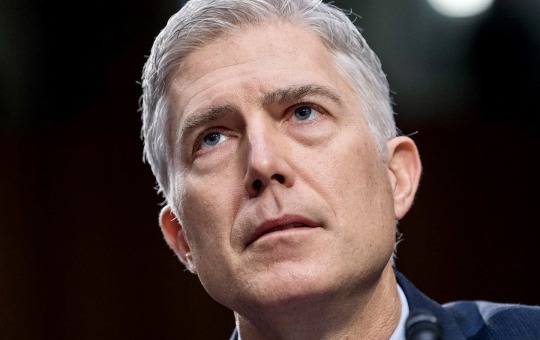
Born on 29 August 1967 in Denver, Colorado, Neil McGill Gorsuch is an American lawyer and jurist who serves as an associate justice of the Supreme Court of the United States. He was nominated by President Donald Trump on January 31, 2017, and has served since April 10, 2017.

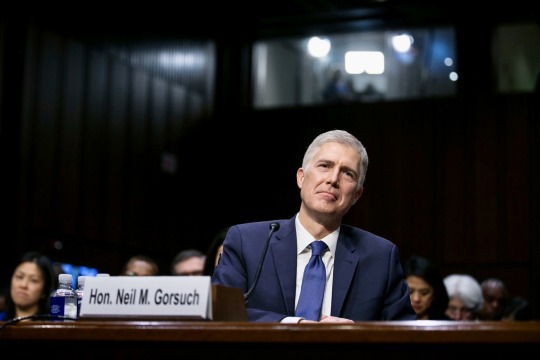
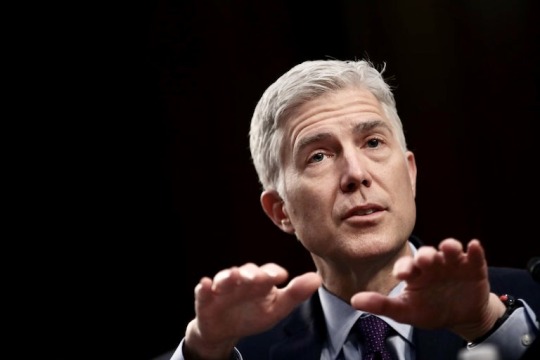
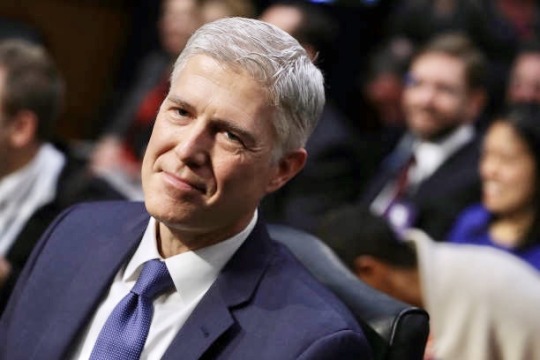
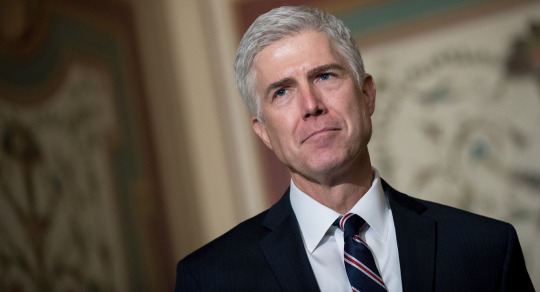
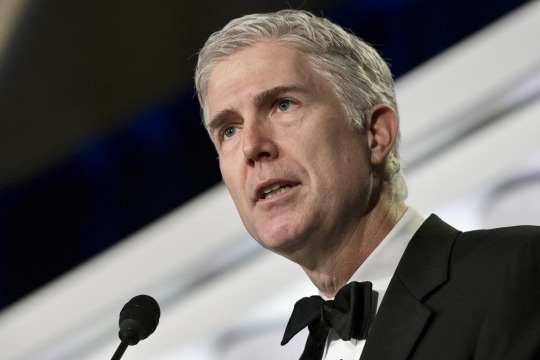
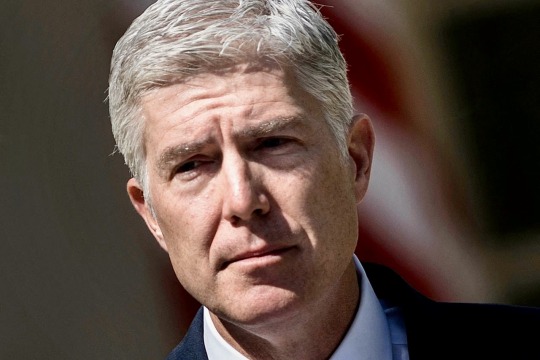
49 notes
·
View notes
Text
The US supreme court just severely gutted prisoners’ ability to appeal their cases.
This supreme court is particularly vile, but this sort of ruling has been in the works for a while.
20 notes
·
View notes
Text
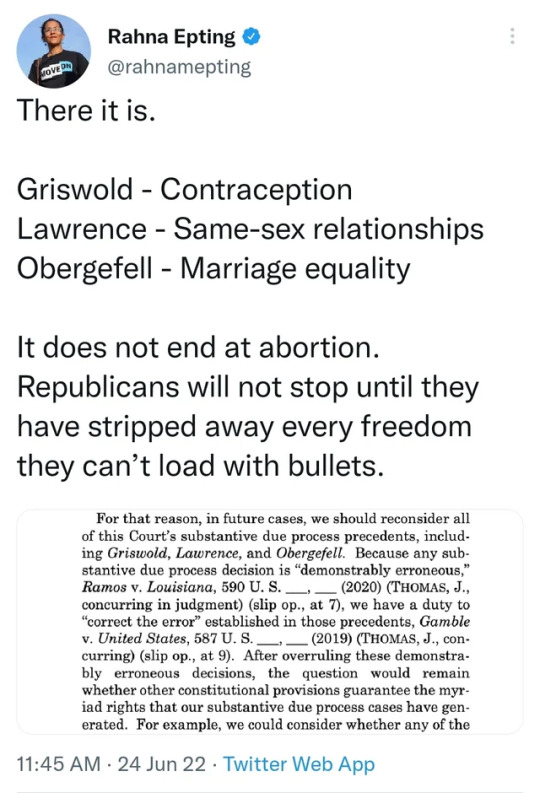
#american law#lgbtq#lgbtq community#lesbian#nonbinary#lgbt pride#lgbtqia#queer#lgbtq positivity#lgbt memes#lgbt books#lgbt rp#lgbtlove#lgbtqplus#gay girls#sapphic#nonbinary lesbian#signal boost#please boost#boosting#pls boost#pride and prejudice#lgbt#bi pride#trans pride#pride flag#happy pride 🌈
70 notes
·
View notes
Text
I love it when Canadian sovereign citizens try to use US laws and concepts in Canada
Some gems I've heard include:
"I'm auditing my First Amendment right!"
Canada does not have a First Amendment. When I pointed it out, their response was that I should look at paragraph 2b of the Canadian constitution, which is neither an amendment nor first in a list (I know that sounds obvious, but evidently that's too complex a concept for some people).
"Is [the crime I'm being suspected of] a felony or a misdemeanor?"
The cop's response was exactly what I was thinking: "Neither, this isn't the US."
#first amendment#1st amendment#canada#cndpoli#united states#the united states of america#american law#canadian law#some people are so dumb#first amendment auditor#felony#misdemeanor
6 notes
·
View notes
Text
The way Boden handled that hostage situation at the grocery store was simply amazing. I mean, he stayed calm no matter what, stepped between one of the customers and the armed hostage-taker at the risk of his own life, and in the end he tackled the hostage-taker on the ground and protected him with his own body when the poor kid were planning to do a suicide by police (and how the other firefighters formed a circle around them so the police wouldn't shoot was damn cool too, that's what I call loyalty!). And that was just a few things to mention, there was much more
Anyway, I think the so called justice system in America is no justice at all. They give way too heavy sentences compared the seriousness of the crime and may even sentence people to die. It's so wrong. No kidding that people are afraid of the police when getting in trouble with the law is a guarantee of serious problems...
5 notes
·
View notes
Text
Marijuana Legality: The Quick(er) Version
A few days ago, I started writing a very long, very detailed post about marijuana legality state by state... and it got eaten by tumblr's drafts features.
This post is going to be the Cliff Notes version of that post.
First off, Wikipedia's Legality of cannabis by U.S. jurisdiction page is an excellent resource for this. It doesn't capture everything, but it captures a lot, and you can always go to linked pages for individual states and/or check the linked sources for more information.
The short(ish) version:
Under federal law, specifically the Controlled Substances Act, marijuana is a Schedule I drug and cannot be prescribed or possessed legally aside from a very tightly-controlled quota for scientific research purposes. This scheduling includes language stating that marijuana "has no currently accepted medical use" and "[t]here is a lack of accepted safety for use of the drug or other substance under medical supervision", which is... arguable.
There is a process for changing drugs, including marijuana, to a less restrictive schedule under the Controlled Substances Act or removing them as a controlled substance altogether. But that process hasn't happened for marijuana so far.
Technically, this supersedes state and local law on the subject; state law can be more restrictive than federal law, but not less restrictive, or else the whole idea of federal law governing the whole country is moot. Theoretically, that means that federal police could arrest anyone, anywhere, for marijuana possession under the Controlled Substances Act, regardless of what local authorities say on the matter.
Realistically, that's highly unlikely. Any case where someone gets arrested for marijuana in a state that says it's okay is practically asking for a Supreme Court case on the matter, and said Supreme Court ruling would inevitable be controversial and divisive, and right now everybody's content to just... pretend the federal law doesn't exist when the state says otherwise. Probably some years down the line such a Supreme Court case will indeed happen and cause a shift to the current murky and unstable status quo, but it's highly unlikely that said Supreme Court case will star you, random marijuana user. (And if it does, well, upside is there's bound to be a bunch of folks willing to represent you for free just to get in on the action!)
Also, the federal police are busy, and hey, if they don't have to worry about marijuana use in a large chunk of the country, that just gives them more time to go after other kinds of federal criminals.
So, if state law's what matters, what do the states say?
Again, I point you to the Wikipedia page outlining exactly this. (It's most of what I'm using for a resource here myself.)
Recreational use of marijuana is legal in 24 states (Alaska, Arizona, California, Colorado, Connecticut, Delaware, Illinois, Maine, Maryland, Massachusetts, Michigan, Minnesota, Missouri, Montana, Nevada, New Jersey, New Mexico, New York, Ohio, Oregon, Rhode Island, Vermont, Virginia, and Washington state), three U.S. territories (Guam, Northern Mariana Islands, and U.S. Virgin Islands), and Washington D.C. Note that Ohio's measure here is newly passed and doesn't actually take effect until December 7, 2023, three days from now.
Commercial distribution is legal everywhere that recreational use is legal except Virginia and Washington D.C.
Personal cultivation for recreational use is legal everywhere that recreational use is legal except Delaware, Illinois, New Jersey, and Washington state.
Recreational use is decriminalized in Hawaii, Louisiana, New Hampshire, and North Dakota.
Medicinal use of marijuana is legal in 38 states (the recreational use ones, plus Alabama, Arkansas, Florida, Kentucky, Oklahoma, Pennsylvania, South Dakota, Utah, and West Virginia), four U.S. territories (the recreational use ones plus Puerto Rico), and Washington D.C.
Medicinal use is decriminalized in Nebraska and North Carolina.
Iowa gets a special shout-out here for allowing medicinal marijuana, but not allowing any actual distributors of said medicinal marijuana in the state; medicinal marijuana patients need to go out-of-state to get their marijuana supplies, but those supplies remain legal upon bringing them back to Iowa.
Personal cultivation for medicinal use is legal everywhere that recreational cultivation is legal plus Illinois, Washington state, Hawaii, Oklahoma, and South Dakota.
Marijuana remains illegal for both medicinal and recreational use in ten states: Georgia (though several cities/counties in Georgia have decriminalized it), Idaho, Indiana, Iowa, Kansas, South Carolina, Tennessee, Texas, Wisconsin, and Wyoming, and also the territory of American Samoa. Everywhere but American Samoa has some exception for CBD oil, though, with limits on the percentage of THC present.
A number of Native American reservations have also legalized marijuana use, either recreational or medicinal.
Most of these laws have restrictions beyond just "it's legal". You might have to be 18 to purchase marijuana, or 19, or 21; there's generally a maximum amount you're allowed to possess, or grow, at one time; medicinal use might be restricted to specific symptoms or conditions outlined in the original law; details may vary about having it in a public place, or about the specific forms allowed.
Also, some laws specifically address potential effects of marijuana use within the state beyond simple criminality. Can marijuana use be considered in a child welfare case, and held against you as a parent? Can use of medicinal marijuana get you fired if you fail a drug test your employer gave you, or just because your employer doesn't like it? Does being fired for using marijuana count as being fired "for cause" for unemployment purposes? Can marijuana use disqualify you from accessing needed health care like organ transplants? Excellent questions! The answers will vary. Or they might not be specified in the original statute at all, which leaves it open for the courts to decide.
If you're going to purchase and/or consume marijuana, please, look up all the details of your local laws on the matter beforehand.
#marijuana laws#cannabis laws#cannabis legalization#marijuana#cannabis#pot#weed#us law#american law#united states law#drug law#substance law#controlled substances act#controlled substances
8 notes
·
View notes
Text
Roe, Blackmun, and Abortion: A Reflection on the Interpretation of U.S. Law
As a woman, and as a human rights advocate, I was surprised to learn how little I knew about Roe v. Wade and the process by which the original Supreme Court decision was decided upon in 1973. This is unsurprising, since I was born more than 10 year post-Roe. My life was one where the protections afforded by Roe simply were – up until this summer anyway. I never learned about Supreme Court Justice Harry Blackmun and knew only sparse details about the case itself.
The podcast Slow Burn dedicated significant time and energy to research this in their episode “Roe Against Wade.” It details the journey of Justice Harry Blackmun – a centrist who came from extreme poverty and was “ludicrously modest” according to those who knew him. The story follows him from his initial hesitance to accept President Nixon’s nomination all the way to the present day where he has only grown more resolute about his opinion on Roe. In his work for the Court, Justice Blackmun identified as a strict constitutionalist, someone who believes the Constitution must be interpreted in the context of today’s problems. His life-long friend, Chief Justice Burger, assigned him to write the Roe opinion with the hope that it would be a narrow ruling. But, Blackmun wanted to be recognized as an independent thinker – not as a political pawn or a copy of Burger – so he set to work to learn as much about abortion history as he could in an attempt to discover whether or not abortion was a constitutional right. His research was extensive, ranging from ancient Greek and Roman perspectives on abortion to the medical profession’s ethics (informed by the Hippocratic Oath) to common law and English law. I was fascinated by how much of this knowledge he rolled into his opinion on the case. Most Court opinions are not so lengthy, but Blackmun’s arguments provided a strong enough case of support for Roe that an astounding seven out of nine Justices assented to the opinion – resulting in the legal right to abortion.
One thing that Blackmun (and other judges in the U.S.) struggled with was the fact that many laws are written vaguely. If you have read my blog post about the Declaration of Independence, Ibram X. Kendi, and the importance of language in our founding documents, you’ll notice a connection here. Like in Jefferson’s declaration where “all men” were said to be created equal – who did he mean by “all men” in that statement? Who was deserving of freedom, and what rights came with that freedom? It is difficult to prove with certainty that any law was ever created with the specific intent to be vague, but it does seem as though vague laws allow flexibility to interpret the law in ways that can be exploited to the benefit of one group or another. Individuals, groups, and our own leaders can then act in ways that they feel the law allows them to until they are legally challenged and a decision must be made by the courts to decide what is lawful and what is unlawful. The outcomes may be different depending on who is judging the case. This phenomenon of “legislating from the bench” is decried by some and lauded by others. I have to wonder if those who laud this act – sometimes called “judicial activism” – are correct.
For those who are less familiar with American law and are wondering why “legislating from the bench” or “judicial activism” might be a good thing, I will provide some foundational knowledge. American law is rooted in the United States Constitution, a document that was signed by 39 of 55 delegates in 1787 and was ratified by all of the existing states by 1790. The Bill of Rights, a separate document originally proposing 12 amendments to the Constitution that was ultimately reduced down to ten, was ratified in 1791. These ten amendments provided the foundation for American freedoms. It is important to note that these amendments provided no protection from slavery, no right to due process of law or equal protection under the law, and no protection of the right to vote (on account of race, color, previous condition of servitude, sex, or age). It was not until 1920 that women were granted the right to vote with the passage of the 19th Amendment. Despite the protection of these rights being written into constitutional law, there are many human rights issues that have not been given legislative protection – in part, due to the issue of vagueness Blackmun noted in his own opinion with Roe. For example, in June 2020, the U.S. Supreme Court dealt with a case of employment discrimination on the basis of sexual orientation and gender identity. Because the language of the Civil Rights Act of 1964 only used the language “sex” the Court had to decide if the same law protected sexual orientation and gender identity. Justices on the bench had to decide what the intent of that law was and how to apply it to the current case. They chose to legislate from the bench, interpreting that if the original law was created “because of sex” then it necessarily included sexual orientation and gender identity. This was a major victory for the LGBTQ community, giving those who have experienced employer discrimination the right to file a complaint with the Equal Employment Opportunity Commission (EEOC). However, as our recent experience with the overturning of Roe has shown us, any of these rights which are not written into constitutionally-protected laws are at risk of being lost.
As a woman, a parent, a human rights advocate, and a social worker, I wish more people knew about the history behind the case of Roe v. Wade and were able to learn about the amount of research and contemplation that informed Blackmun’s final decision. A year before the decision was made, Gallup released poll results that showed 2 out of 3 of Americans believed abortion should be a matter settled between a woman* and her doctor. According to Pew Research Center survey results from July of this year, 62% of Americans say abortion should be legal in all or most cases, and these numbers are higher among young adults and those aged 30 to 49. Despite having majority support, the issue of abortion and reproductive rights remains a contentious and politicized one.
Blackmun and his colleagues hoped to settle the issue of abortion rights once and for all with their decision in 1973. Now that I have read the opinion in its entirety, I cannot say that I agree with everything Blackmun said. I do agree, however, that there should be a guaranteed right to privacy which includes liberty from being forced to complete an unwanted pregnancy. Until Congress can pass a law explicitly stating a person’s right to bodily autonomy and reproductive rights, our nation will continue to see cases like this brought before the courts. Laws are made by legislators, and we have the power to decide which legislators represent us. I encourage all eligible voters to leverage their voting power in this fight. Show up to the polls in November – or submit an absentee ballot – and do not forget to research your candidates at the local, state, and federal level. I also highly encourage you to check out Slow Burn’s podcast episode on this topic. Whether you are for or against abortion, the background and history on this issue may help further inform your opinion and impact how you choose to advocate on the topic moving forward.
* The term “woman” was used in this context because this was the language utilized in the Gallup poll and is not a reflection of my own personal beliefs. I know that the issue of abortion is one that affects many more people than just women and want to express my continued support for pregnant persons of all identities, as well as those who are continuing to fight for the right to bodily autonomy and reproductive freedom.
#Abortion#Harry Blackmun#Roe v Wade#Reproductive Rights#American Law#Supreme Court#Social Justice#Judicial Activism#Vote
8 notes
·
View notes
Text
5 big things for understanding American labor law are
1. MOST of the congressional law and protections for workers is from the 30s-50s and situations are simply not comparable. The language of the bills, acts, and statutes SHOW that there wasn’t this concept of multi-billion dollar corporations. Monopolies weren’t the same then as they are now. LABOR isn’t the same as it was then. The situations aren’t comparable but the standard for processing labor violations is not from any more recent than this period.
2. Recent law for labor law is “common law” where new law is made out of interpretation by the court BUT through the lens of these old acts, mainly the NLRA (1935)
3. Labor law is NOT criminal law. “Breaking the law” as an employer does not mean consequences are similar to YOU breaking the law at work. Labor violations by employers are heard by the national labor relations board (NLRB) and punishments are typically 1. Reinstatement of unfairly fired employee 2. SOMETIMES money damages 3. An injunction where the employer pinky prommies never to do it again until next time
4. Labor law is INTENTIONALLY toothless. The acts we cling to were a compromise BECAUSE workers were sabotaging, they were being violent, they were attacking bosses and blowing up factories and hurting business. So the GOOD we have never came from benevolent overlords, it was a plea for workers to stop taking matters into their own hands
5. What “hurts” the economy is corporate greed. What “hurts” a business is bosses unwilling to budge. What “hurts” commerce is those in charge expecting blood, sweat, and tears from the people working their factories and warehouses and train yards and shipping centers. Unions, strikes, direct action are GOOD and RIGHT. If employers and CEOs and the president gave a shit about “the people who will be impacted by a strike” they would give the desperate workers the meager demands they’ve made. Yes it’ll be inconvenient. Yes it can cause major problems, and that is ALL the power workers have to bargain for respect and the ability to live and make ends meet.
Be angry at the right people. The workers are not your enemy. And every “civil” and “correct” avenue for remedy we have, we only have because the bosses were scared of what workers dissatisfied with exploitation were willing to do to be heard.
14 notes
·
View notes
Text
My Mother Gave Me Life (A Fact Piece)
Most of the time when I publish content because I feel strongly about an issue that is being hotly debated and the battles lines are drawn, and it’s crystal clear that no matter who says “what”, neither side really has any intention of being persuaded to change their mind or position, I let readers know that I’m publishing “An Opinion Piece”. But I’m making an exception because I feel so strongly about this issue that I’m calling my position “A Fact Piece”.
There are a variety of hashtags in various social media posts:#Abortion … #AbortionIsHealthcare … #AbortionBan … #ProLife … #ProChoice … etc.
Why do all the commercials for any prescription medication have a WARNING which says “Do not take if pregnant or even thinking about getting pregnant as it may harm the unborn”?
They don’t indicate how many weeks or which trimester or moment of conception. In fact, they back it up all the way to BEFORE you even get pregnant.
I’ll tell you why they say that. For the drug companies, it’s not about PRO-LIFE or PRO-CHOICE. It’s not about their ethics or morality or beliefs. They just don’t want to get SUED! They know that the science proves that an “unborn” is living and can be harmed or injured.
You could argue with the drug companies. But I’ll bet they won’t delete that WARNING from their advertisements. No way! When there is a potential for a lawsuit that might result in them paying out millions of dollars in damages … MONEY TALKS!! In the business world, it’s simply a matter of “Risk Management” and protecting their profits.
Anyway! Regardless of what the drug companies say or do, I only have two words for those who support abortion and demand the right to shed innocent blood.
“YA MOMMA!!”
That’s right! ALL you people arguing about your reproductive rights are ALIVE TODAY because YA MOMMA (your mother) exercised her reproductive rights and LET YOU LIVE!! She gave you the gift of life.
♥♥♥
Mother’s Day honors mothers and motherhood, is observed in 50+ countries and is celebrated the first Sunday in the month. Happy Mother’s Day!

CURRENT NEWS REPORTS REGARDING ABORTION (FOR AND AGAINST):
Abortion advocates’ strategy depends on pills. An information gap threatens their efforts. — POLITICO
The Anti-Abortion Movement’s Post-Roe Agenda: Inconvenient, Illegal, Unthinkable | National News | US News
Abortions Before Fetal Viability Are Legal: Might Science and the Change on the Supreme Court Undermine That? — leaps.org ~ “Viability-the potential for a fetus to survive outside the womb-is a core dividing line in American law.”
The word “viable” is from French, from Medieval Latin *vītābilis (“capable of life”), from Latin vīta (“life”). If something is not living, then it can’t die! What is “key” in the legal definition of “viability” is THE FACT that the fetus is ALIVE! The baby is living INSIDE the womb. However, if you remove the fetus from the womb prematurely, it could or will result in DEATH.
Abortion Laws by State 2022 | World Population Review
If I were create a hashtag, it would be #AbortionIsMURDER.
View On WordPress
(Originally published at https://read.cash.)
8 notes
·
View notes
Text
Random Fact #3,619
Slavery is still legal in the US.
According to the 13th amendment of its constitution, it's okay to have slave labour so long as the enslaved people are convicts in jail/prison.
( "Neither slavery nor involuntary servitude, except as a punishment for crime whereof the party shall have been duly convicted...")

#slavery#did you know#random facts#little known fact#country facts#sad but true#united states#american law
4 notes
·
View notes
Text
Because people are going to ask me about this.
Yes, I am aware these laws don’t affect me in anyway because I’m a Cis man, and English.
That’s not the point.
Nobody deserves to have their rights taken away, and no I’m not debating if abortion is a right or not. It is! End of discussion.
I’m just trying to have a bit of empathy, and sympathising with people who are affected by this bull shit. Having someone say “I understand.” Can be a huge relief.
So, yeah to my AFAB American followers. I’m sorry. I know that means little but, I am.
4 notes
·
View notes